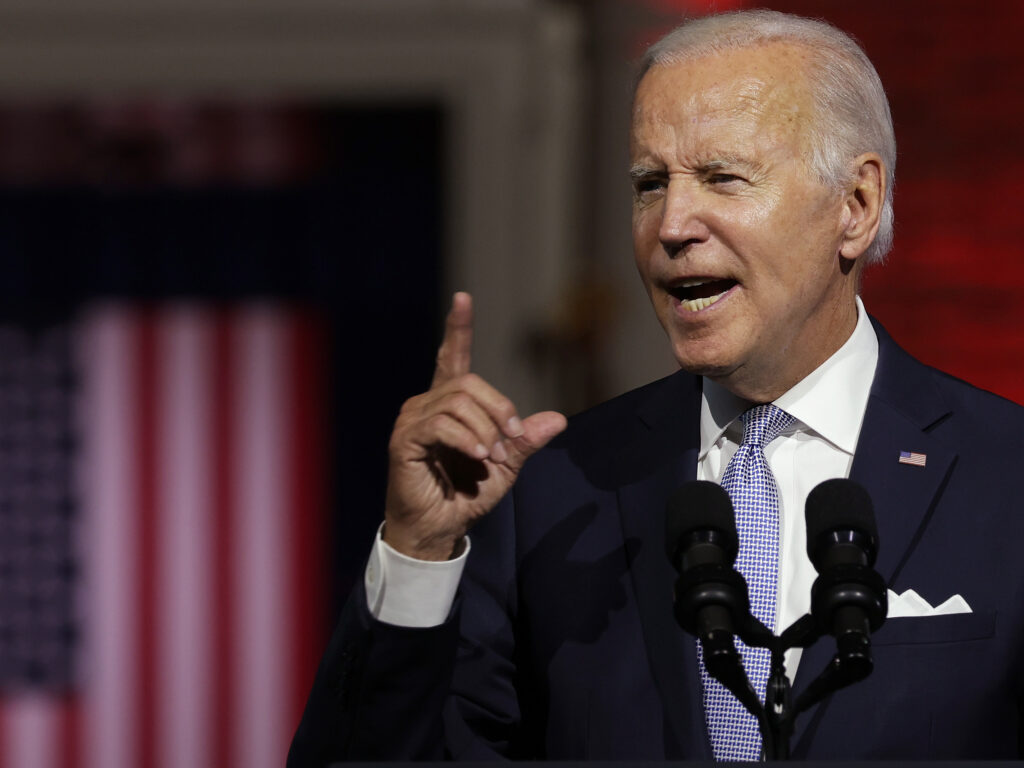Democrats’ Messaging Challenges
Touting the accomplishments of the last two years isn't working.

Two related thumbsuckers shed some light on the midterm campaign.
In POLITICO’s West Wing Playbook, Sam Stein and Alex Thompson discuss “Biden’s ‘worst performing message’.“
It’s an article of faith among Democrats that their party is deeply hampered by its inability or unwillingness to tout its own accomplishments.
But what if that conventional wisdom wasn’t just wrong but terribly, harmfully so?
That’s the warning being issued by one of the party’s most seasoned pollsters, STAN GREENBERG. In memos, private communications and interviews, Greenberg has been imploring the party to — let’s put this bluntly — shut the hell up about all the work it’s done. It’s not that voters don’t care. He says voters actively turn against Democrats when they hear it.
“It’s our worst performing message,” Greenberg told West Wing Playbook. “I’ve tested it. I did Biden’s exact words, his exact speech. And that’s the test where we lost all of our leads… It said to the voters that this election is about my accomplishments as a leader and not about the challenges you’re experiencing.”
[…]
I’m stunned about how much of the Democratic commentary is winging it,” he said in an interview. “[Republicans are] hitting us on crime and border and inflation…. That has huge power. And we have the self-satisfied message of how much we’ve accomplished rather than being focused on what is happening to people.”
Asked if President JOE BIDEN himself had it right, he didn’t flinch. “Nope,” said Greenberg. “I saw their visuals when they were campaigning with the West in which they were talking about helping families with high costs. So they’ve made a turn with addressing it but they’re also combining it with a message of how great a job they’re doing.”
[…]
Greenberg’s advice for Democrats is not to completely ignore the legislation they’ve passed, but to present it as useful remedies for tackling the problems of the future. Tout student debt relief and prescription drug price reforms, but only “in the context of how it is helping them with the cost of living, not as a means of boasting about your accomplishments.”
For all his saltiness about the current state of his party’s affairs, Greenberg is not entirely nihilistic about the upcoming election. He described himself as “bearish” but “keeping the door open” to the possibility of a decent night for Democrats, citing intense polarization, the registration wave of women voters and DONALD TRUMP‘s lingering presence in the national conversation as factors that would undoubtedly help.
“It’s amazing that this is a competitive election at all,” he said.
Ultimately, though, Greenberg warns that Democrats need a new object to present voters rather than one that’s done and dusted. And on that front, the data he’s crunched for Democracy Corps, the firm he started with fellow Clinton strategist JAMES CARVILLE, shows an unambiguous winner: revive the expanded child tax credit.
The policy, which provided $3,000 to $3,600 per child for families that made $150,000 per couple or $112,500 per single parent unit, had been a major component of Biden’s Covid-relief package. But it lapsed and talks to renew it have completely stalled. Greenberg urged his fellow party members to push for reviving it in the next few weeks, even if it leads to pushback (questionable as it may be) that the policy is inflationary.
“They’re elites and live in a world of college educated voters who didn’t have it as a lifeline. They think our own base responds to identity politics rather than economics,” he said. “If your goal is to win an economic argument, go on ‘Morning Joe.’ If the goal is to win an election, look at the fucking data.”
So, on the one hand, I get it. People tend to vote prospectively rather than retrospectively. But, surely, having delivered programs that people find helpful should be a strong signal of future performance. Unless, of course, they feel they haven’t been helped by the programs our even find them harmful.
At CNN Politics, Sam Fossum and Sonnet Swire report “Biden says it’s his ‘intention’ to run again in 2024.“
President Joe Biden said Friday that while he has not made a formal decision about running for reelection in 2024, it is his “intention” to do so.
“The reason I’m not making a judgment about formally running or not running, once I make that judgment, a whole series of regulations kick in and I have to be – I treat myself as a candidate from that moment on. I have not made that formal decision, but it’s my intention – my intention to run again. And we have time to make that decision,” Biden told MSNBC’s Jonathan Capehart in an interview at Delaware State University in Dover.
More directly relevant to Greenberg’s advice, though:
On Friday, the President said that first lady Dr. Jill Biden thinks that the work they are doing is “very important.”
“Dr. Biden thinks that – my wife – thinks that I – that we’re – that we’re doing something very important, and that I shouldn’t walk away from it,” Biden said.
Asked what his late son Beau Biden would say to people who think the President is too old to run, Biden said: “It’s not so much [what] he’d say to those people. What he’d say to me in my view. The only reason to be involved in public life is can you make life better for other people. And depending on who the opponent is, if they have a view that is such the antithesis of what I believe democracy and I believe is good for average Americans, then his argument was, Dad, you have an obligation to do something.”
In the wide ranging interview, Biden also vowed to use his veto power to protect reproductive rights if Republicans win control of Congress in the midterms and pass laws to outlaw abortion nationwide.
Asked how he would “protect women,” Biden said he would “veto anything” that Republicans put forward to restrict access to the procedure.
“For them to outlaw Roe, outlaw the right of a woman to make a choice with their doctor, to not make exceptions for rape, and incest, and et cetera, and pass it out of the Congress to make it the law of the land, the president has to sign it. I’ll veto it,” Biden said of Roe v. Wade, which had guaranteed a federal constitutional right to abortion until the Supreme Court overturned the ruling in June.
This comes after the President sought to mobilize voters in his party this week by promising to sign a law to codify abortion rights in January if voters elect more Democrats in order to ensure such legislation could pass.
The President’s vow echoed remarks from earlier in the week when he said of the prospect of a Republican-controlled Congress passing a bill banning abortions nationwide: “If such a bill would pass in the next several years, I’ll veto it.”
On the economy and inflation, the President brushed off polls showing the majority of voters disapprove of the direction of the economy, saying that “a lot of what we’ve done and we’ve passed has not kicked in yet.”
He argued the GOP does not have a plan to address Americans’ economic concerns, saying: “They don’t have a platform other than to tear down what I’ve been able to do, we’ve been able to do. And I don’t know what they’re for.”
Biden seems to me to be doing a good job of contrasting what the next two years look like if Democrats retain control of the agenda or if Republicans take over. In the latter case, they’ll surely block any meaningful policy initiatives Biden would otherwise offer.
Beyond that, while it’s probably not helpful for the midterms, he’s almost certainly right that it’s too early to judge the effectiveness of programs that have only been in place for weeks or months. Democrats can frame them as attempts to help middle- and lower-class families. But, if they’re not feeling the effects yet, it may be a hard sell. I don’t know what Biden or Congressional Democrats can do to change that.
Similarly, I’m sure the expanded child tax credit would be popular with some and, especially at the lower end, be genuinely helpful to those struggling to make ends meet. ($150,000 seems like a high threshold, though.) But Biden didn’t have the votes for that in this Congress, so I don’t know why supporters would think he would get it passed next go-round.
At the risk of beating a dead horse, this stuff only matters at the margins. There are relatively few truly undecided voters and the vast majority of House and Senate seats are non-competitive. So, really, we’re talking about how motivated folks will be to show up in the handful of contests that could go either way.






It’s hard to run against a platform of anthrax and tire rims.
It is a blind spot of Dems that can’t accept that in general few voters care about programs. They weren’t paying attention to the legislative debates and by the time the the programs’ effects filter down to the voter level they have been disconnected from the who, how and why.
The fact that many programs, particularly infrastructure and support programs are administrated at the state level, allows governors and legislators who opposed the programs to claim credit. No one cares about the legislative history.
If “undecided” voters aren’t repulsed by criminality, incompetency, and fascism, what makes anyone think you can attract them with political context? Messaging is irrelevant – it’s all about spite.
Not to the extent that frequently programs become “things that the 5o several states will now take over from their block grants.” I’ve seen this complaint a lot in DoE grants that get rejected even for study because the district won’t have the funds to continue the program after the grant test period ends. “It doesn’t matter whether it works or not if we can’t fund it ourselves after the study.”
Democrats have been really good at “stop-gap” measures. And Republiqans have been really good at making sure they stay stop-gap measures. It a very delicate balance that guys like Greenberg and Carville should know better than to mess with. It’s almost like they believe that Democrats in government believe in rising tides raising all the boats.
The pretty consistent pattern of the President’s party doing poorly in the first midterm suggests that successful policy doesn’t matter much in terms of political benefit. So yes, voters are prospective.
So it seems rather obvious to focus politics and messaging on what the public cares about now.